
Juneteenth, celebrated as Freedom Day, stands as a poignant reminder of the end of slavery in the United States. The date, June 19, 1865, marks the arrival of Union Army General Gordon Granger in Galveston, Texas, where he proclaimed freedom for the enslaved African Americans, over two years after President Abraham Lincoln issued the Emancipation Proclamation. Despite the proclamation's existence, its enforcement in Texas was delayed for various reasons until General Granger intervened.
Since 1866, Juneteenth has held significant cultural importance in Texas and has since spread across the nation. It serves as a day of commemoration, celebrating freedom while honoring the resilience and sacrifices of African Americans throughout history. Moreover, it urges us to continue the quest for equality and justice.
While we observe Juneteenth, it's imperative to recognize the ongoing struggle for racial justice in the United States. While strides have been made, systemic racism persists, underscoring the necessity for continued efforts to ensure dignity and respect for all individuals. Juneteenth embodies the fortitude of the African American community amidst adversity, urging us to persist in the pursuit of justice and equality.
There are myriad ways to honor Juneteenth, from participating in community events and parades to deepening one's understanding of its historical significance. Here are some resources to aid in your exploration:
- The National Museum of African American History and Culture: The museum has a Juneteenth webpage with information about the history of the holiday, its significance, and how it is celebrated. The webpage also includes links to additional resources and events.
- Juneteenth.com: The website has a wealth of information about Juneteenth, including its history, significance, and how it is celebrated. The website also has a calendar of Juneteenth events across the United States.
- The Juneteenth Legacy Project: This organization aims to preserve and promote the history and legacy of Juneteenth. The website has information about the organization’s initiatives and resources for educators and students.
Let's commemorate Juneteenth as a historic event and a catalyst for meaningful reflection and action toward a more equitable society.
Additional Resources on Dismantling Oppression:
NYSCADV Primary Prevention Toolkit-Dismantling Oppression: Resources in this section address the ways we can, and must, engage with our communities and work to acknowledge the interconnectedness of all forms of oppression – racism, sexism, heterosexism, classism, adultism, ableism, etc. Challenging imbalances of power are key to creating a healthy and safe community, a community which views all of its members as valuable, ensures access to resources and opportunities and which views violence, including institutional violence, as intolerable and works in partnership and as allies to prevent it.



